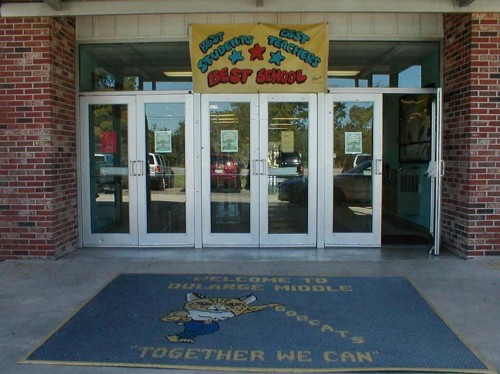
Dularge Middle sets bar for educating the poor
February 22, 2011Thursday, Feb. 24
February 24, 2011Dear Editor,
Here we go again! Louisiana faces another season of “BandAid” economic solutions to our state’s budgetary crisis. From the governor’s office, we have heard repeated calls that the state government needs to pursue a strict austerity philosophy. Workers need to be trimmed from our public payrolls, college professors need to increase the size of their classes, and the state should consider selling off our public buildings. But the one proposal that continues to mesmerize our governor when he returns from his frequent out-of-state money-raising trips is his firm belief that state services should be privatized – the corporate community can do a much better job than state government.
Since becoming governor, we have witnessed Gov. Jindal’s attempts to privatize the distribution of food stamps. Later, we heard repeated announcements about the cost-saving benefits to be gained from privatizing our Medicaid and Medicare programs. In recent weeks, there have been open-ended statements about other state programs that would benefit from corporate supervision.
What all of this reveals is a crisis in leadership: the governor has no solution to the fiscal emergency our state budget faces. Privatization has become the pea in the pod in the familiar game of “bait and switch.” More importantly, this private sector alternative reveals the governor’s deep-seeded confidence in the corporate community to solve the state’s economic woes.
Hopefully, at some point in his educational preparation, the governor and his advisors studied recent American history, especially the 10-year period following World War I. Sometimes ridiculed for its superficial prosperity, the 1920s became a decade of unusual trust or worship of the nation’s corporate leaders by our public servants. You have quotes attributed to President Calvin Coolidge suggesting that “the United States Chamber of Commerce effectively speaks for the economic interest of the United States”; or, more pointedly, “The men who build a factory, build a temple and the men who work in that factory worship that temple.” Possibly, at no other time in our recent history has our country’s leaders expressed such unfettered adoration for private sector’s corporate leadership.
Bruce Baton took this a step further in his 1924 book, “The Man Nobody Knows.” He felt that beyond the religious significance, Jesus Christ served as the model for the true corporate executive. He took 12 of his followers, formed a board of directors and went out and conquered the world.
From almost every mountaintop in the country, corporate leaders, in the 1920s, preached a gospel of corporate beneficence. They endorsed the proposition that capitalism would destroy poverty and establish a new world order under the banner of “Welfare Capitalism.” Within the national government, the Secretary of Treasury Andrew Mellon and the Secretary of Commerce Herbert Hoover served as the Pied Pipers for lower income taxes and greater reliance on the nation’s competitive spirit. They felt that the best and the brightest would rise to the top to utilize their skills for the economic benefit of all Americans.
In 1929, The Brookings Institute provided an insight into the fiscal benefits of “Welfare Capitalism.” The self-serving Revenue Acts of 1924 and 1926 produced a greater concentration of wealth at the top. According to income tax statistics, the Institute discovered that nearly 350,000 heads of families saved more money with the privatization of America reached a new height in his inaugural address when he proclaimed that “today, in America, we stand on the threshold of the final triumph over poverty.” Less than 10 months later, the country found itself harvesting the early grapes of our misplaced trust in corporate America’s leadership.
Privatization is no cure all for our fiscal crisis. We have the highest sales and excise taxes in the nation and the lowest property taxes. Who pays? The poorest 20 percent pay 12.1 percent in Louisiana taxes whereas the wealthiest 1 percent pay less than 6 percent. Our tax code, from top to bottom, needs a meaningful revision. We need a leadership that truly recognizes the budgetary crisis with substantive proposals to alleviate the uncertainty within our public sector.
Paul Leslie, Ph.D.,
Thibodaux, La.




